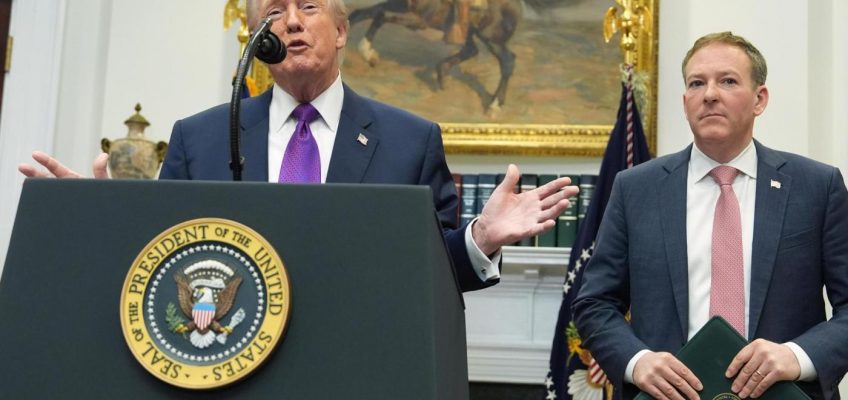By MATTHEW DALY
WASHINGTON (AP) — A coalition of health and environmental groups sued the Environmental Protection Agency on Wednesday, challenging its determination last week that revoked a scientific finding that has been the central basis for U.S. action to regulate greenhouse gas emissions and fight climate change.
Related Articles
Many Democrats are still down on the Democrats, a new AP-NORC poll finds
Late-night host Stephen Colbert isn’t backing down from public dispute with CBS bosses
Judge blocks deportation of Palestinian activist who led protests at Columbia
Trump administration backs Kalshi, Polymarket as states move to ban prediction markets
Pennsylvania man cleared after 43 years in prison for murder denied bail during deportation fight
A rule finalized by the EPA on Thursday rescinds a 2009 government declaration known as the endangerment finding that determined that carbon dioxide and other greenhouse gases threaten public health and welfare. The Obama-era finding is the legal underpinning of nearly all climate regulations under the Clean Air Act for motor vehicles, power plants and other pollution sources that are heating the planet.
The repeal eliminates all greenhouse gas emissions standards for cars and trucks and could unleash a broader undoing of climate regulations on stationary sources such as power plants and oil and gas facilities, experts say.
The legal challenge, filed in the U.S. Court of Appeals for the District of Columbia Circuit, asserts that the EPA’s rescission of the endangerment finding is unlawful. The 2009 finding supported common sense safeguards to cut climate pollution, including from cars and trucks, the lawsuit says. Clean vehicle standards imposed by the Biden administration were set to “deliver the single biggest cut to U.S. carbon pollution in history, save lives and save Americans hard-earned money on gas,” the coalition said in filing the case.
After nearly two decades of scientific evidence supporting the 2009 finding, “the agency cannot credibly claim that the body of work is now incorrect,” said Brian Lynk, a senior attorney at the Environmental Law & Policy Center.
“This reckless and legally untenable decision creates immediate uncertainty for businesses, guarantees prolonged legal battles and undermines the stability of federal climate regulations,” Lynk said.
The case was brought by groups including the American Public Health Association, American Lung Association, Alliance of Nurses for a Healthy Environment and Physicians for Social Responsibility, along with environmental groups such as the Center for Biological Diversity, Conservation Law Foundation, Environmental Defense Fund, Natural Resources Defense Council and Sierra Club.
The suit named EPA Administrator Lee Zeldin and EPA itself as defendants.
President Donald Trump said in announcing the repeal that it was “the single largest deregulatory action in American history, by far,” while Zeldin called the endangerment finding “the Holy Grail of federal regulatory overreach.”
The endangerment finding “led to trillions of dollars in regulations that strangled entire sectors of the United States economy, including the American auto industry,” Zeldin said. “The Obama and Biden administrations used it to steamroll into existence a left-wing wish list of costly climate policies, electric vehicle mandates and other requirements that assaulted consumer choice and affordability.”
Environmental groups described the move as the single biggest attack in U.S. history against federal authority to address climate change. Evidence backing up the endangerment finding has only grown stronger in the 17 years since it was approved, they said.
Under the Clean Air Act, EPA is legally required to limit emissions of any air pollutant that causes or contributes to “air pollution that may reasonably be anticipated to endanger public health or welfare.” In 2007, the Supreme Court held in Massachusetts v. EPA that carbon dioxide and other greenhouse gases are “air pollutants” under the Clean Air Act and told EPA to determine, based on the science, if that pollution endangers human health and welfare. EPA made that determination in 2009, which led to new standards for vehicles. It built on that finding when issuing other standards.
The EPA’s own analysis found that eliminating the vehicle standards will increase gas prices and force Americans to spend more on fuel, advocates said.
EPA’s repeal of the endangerment finding, along with the elimination of safeguards to limit vehicle emissions, “marks a complete dereliction of the agency’s mission to protect people’s health and its legal obligations under the Clean Air Act,” said Dr. Gretchen Goldman, president and CEO at the Union of Concerned Scientists.
“This shameful and dangerous action … is rooted in falsehoods, not facts, and is at complete odds with the public interest and the best available science,” Goldman said. Heat-trapping emissions and global average temperatures are rising — primarily due to the burning of fossil fuels — contributing to a mounting human and economic toll across the world, she said.




